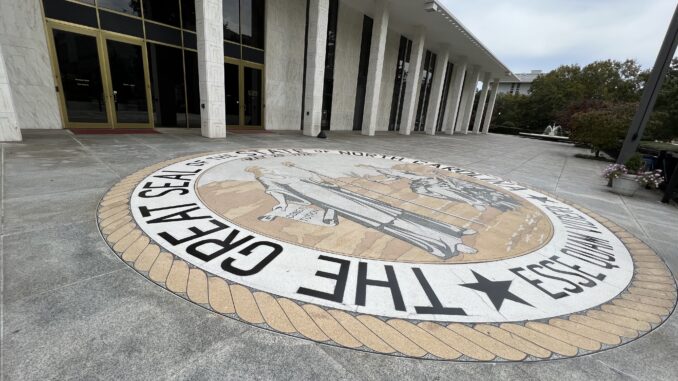
RALEIGH — Five more of Democratic Gov, Roy Cooper’s vetoes were overridden by the legislature on Oct. 10. As of this latest round of overrides, the General Assembly’s override success rate this session is now 19 for 19.
The governor has now issued 94 vetoes over his two terms in office. That number far surpasses the total of 35 vetoes issued by the four governors in North Carolina who had veto powers; Hunt – 0, Easley – 9, Perdue – 10, and McCrory – 6.
The vetoes successfully overridden included some Democratic support in the House, however, no Senate Democrats voted in support of the overrides.
The House vote came in at 77-39 on the veto override of House Bill 600, Regulatory Reform Act of 2023. The override had Democratic support from Reps. Carla Cunningham (D-Mecklenburg); Nasif Majeed (D-Mecklenburg); Garland Pierce (D-Scotland); Shelly Willingham (D-Edgecombe); and Michael Wray (D-Northampton) all voted to override the veto. The Senate overrode the veto by a vote of 30-18.
For Senate Bill 678, Clean Energy/Other Changes, the House vote was 77-37. The same five Democrats who voted to override the veto of House Bill 600 also voted to override the veto of Senate Bill 678.
The Senate’s vote came in at 30-19.
Senate Bill 512, Greater Accountability for Boards/Commissions. The House vote was 72-44 and the Senate 30-19.
“Gov. Cooper has made it clear that he wants full control of appointments to state boards and commissions,” Sen. Warren Daniel (R-Burke) said in a statement on the veto override of Senate Bill 512. “His desire to handpick appointees that will do his bidding serves his party, not North Carolinians.”
Warren also said the “knowledge and expertise of the General Assembly and members of the executive branch should be utilized, not stifled.”
Though Gov. Cooper was on an economic development trip to Japan, he announced he was suing over Senate Bill 512.
“This law is a blatantly unconstitutional legislative power grab,” Cooper said in a press release. “Over the years, the North Carolina Supreme Court has repeatedly held in bipartisan decisions that the legislature cannot seize executive power like this no matter what political parties control which offices. The efforts of Republican legislators to destroy the checks and balances in our constitution are bad for people and bad for our democracy.”
Representing Cooper are Eric M. David, Daniel F. E. Smith, and Amanda S. Hawkins, who are attorneys with Brooks, Pierce, McLendon, Humphrey & Leonard.
Cooper’s 55-page lawsuit makes multiple accusations that Senate Bill 512 “facially” violates the Separation of Powers Clause and the Faithful Execution Clause of the state constitution and is seeking a permanent injunction of the law.
The House and Senate override votes for both Senate Bill 747, Election Law Changes, and Senate Bill 749, No Partisan Advantage in Elections, were identical to that of Senate Bill 512.
“North Carolina voters deserve to know their elections are safe and secure,” House Speaker Tim Moore (R-Kings Mountain) said in a statement of the override on Senate Bill 747. “Thankfully they can have that confidence now that we have overridden the Governor’s veto of this commonsense elections bill.”
Following the override of Senate Bill 747, the NC Democratic Party (NCDP) and the Democratic National Committee filed a lawsuit. In a statement, NCDP Chair Anderson Clayton said in part that “North Carolina Republicans are launching an all out attack on democracy itself,” and calling the bill “election suppression.”
Former Hillary Clinton campaign attorney Marc Elias also announced he was suing over Senate Bill 747. In a press statement, Elias said he was filing the lawsuit filed on behalf of three Democrat-tied advocacy organizations; Voto Latino, the Watauga County Voting Rights Task Force, and Down Home North Carolina.
“The plaintiffs allege that the Undeliverable Mail Provision violates the Due Process Clause of the 14th Amendment and places an undue burden on the right to vote in violation of the First and 14th Amendments,” according to Elias’ statement. “The plaintiffs request that the court declare the provision unconstitutional and prevent its enforcement.”



